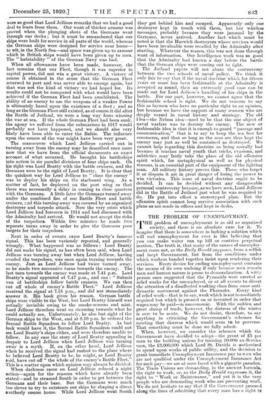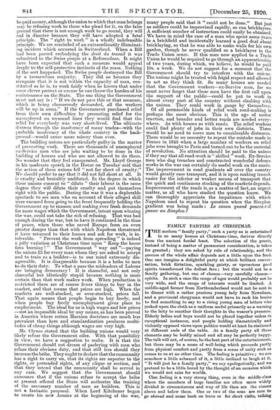THE PROBLEM OF UNEMPLOYMENT.
THE problem of unemployment is as old as organized society, and there is no absolute cure for it. To imagine that there is somewhere in lurking a solution which will end unemployment for ever is like believing that you can make water run up hill or contrive perpetual motion. The truth is, that many of the causes of unein ploy- ment come not, as the Daily Herald supposes, from a selfish and inept Government, but from the conditions under which workers banded together insist upon rendering their services. Every device for ending unemployment contains the means of its own undoing if only because men remain men and human nature is prone to demoralization. A witty person once suggested that the Pyramids were erected as relief works for the unemployed, or at all events to divert the attention of a disaffected working class from some anti- dynastic movement against the Pharaohs. Every kind of relief work—that is to say, work which is not immediately required but which is pressed on or invented in order that wages may be paid—is uneconomic. With the sudden and great slump of trade, however, the distress of the winter is sure to be acute. We do not desire, therefore, to say anything in criticizing the Government's schemes for meeting that distress which would seem to be perverse. That something must be done we fully admit.
When, however, we consider the schemes which the Government have decided to adopt—the grant of £5 per man to the building unions for training 50,000 ex-Service men, the L3,000,000 which Lord St. Davids is authorized to spend upon works of public utility, and the decision to grant immediate Unemployment Insurance pay to men who are not qualified under the Unemployment Insurance Act for such pay—we are at once faced with a gigantic paradox. The Trade Unions are demanding, in the ancient formula, the right to work, or, as the Daily Herald expresses it, the right to " Work or Maintenance," and yet it is the very people who are demanding work who are preventing work. We do not hesitate to say that if the Government proceed along the lines of admitting that every man has a right to be paid money, although the union to which that man belongs may be refusing work to those who plead for it, on the false ground that there is not enough work to go round, they will end in disaster because they will have adopted a fatal principle. The " right to work " is a wholly indefensible principle. We are reminded of an extraordinarily illuminat- ing incident which occurred in Switzerland. When a Bill had been passed embodying the droit du travail it was submitted to the Swiss people at a Referendum. It might have been expected that such a measure would appeal deeply to the self-protective instincts of the mass. Nothing of the sort happened. The Swiss people destroyed the Bill by a tremendous majority. They did so because they recognize that it is not within the capacity of man, con- stituted as he is, to work fairly when he knows that under some clever pretext or excuse he can throw the burden of his maintenance on the State. The one thing the Government mist not say is : " If we do not pass this or that measure, which is being clamorously demanded, all the workers will be up in arms." If the Government purchased relief from their own difficulties by promoting relief for the unemployed on unsound lines they would find that the relief for everybody was very .short-lived. The ultimate distress through the insolvency of many trades—with the probable insolvency of the whole country in the back- ground—would cause more misery than ever.
The building unions are particularly guilty in the matter of preventing work. There are thousands of unemployed ex-Service men who see jobs waiting to be done in the building of houses and who are not allowed to do them. No wonder that they feel exasperated. Mr. Lloyd George in his moderate speech in the House on Tuesday said that the action of these unions fell " not far short of cruelty." We should prefer to say that it did not fall short at all. It is cruelty and brutality undiluted. In the degree in which these unions consent to " dilute " their labour in the same degree they will dilute their cruelty and put themselves right with the public. During the war it was a deplorable spectacle to see men who on account of their alleged skill were excused from going to the front frequently holding the Government up to ransom and making ever fresh demands for more wages which the Government, intent upon winning the war, could not take the risk of refusing. That was bad enough during the war, but to have it continued in the time of peace, when those who saved Europe from an even greater danger than that with which Napoleon threatened it have returned to their homes and ask for work, is in-
tolerable. Prevent the work from spreading " is indeed a jolly variation at Christmas time upon " Keep the home fires burning ! " The Government " way out "—paying the unions £5 for every man whom they are asked to accept and to train as a builder—is to our mind extremely dis- agreeable. It is disagreeable because it is a bribe to men to do their duty. To what a pass the misleaders of Labour are bringing democracy I It is shameful, and not only shameful but idiotically stupid because nothing is more certain than that work makes work. When production is restricted there are of course fewer things to buy in the market, and that means that prices are high. When the markets are well-stocked, or over-stocked, prices fall. That again means that people begin to buy freely, and when people buy freely unemployment gives place to employment. The ideal for us is high wages and low prices —not an impossible ideal by any means, as has been proved in America where rotten Marxian doctrines are much less prevalent than here and standardization produces multi- tudes of cheap things although wages are very high.
Mr. Clynes stated that the building unions would very likely refuse the Government offer. With that possibility in view, we have a suggestion to make. It is that the Government should not dream of parleying with men who refuse their obvious duty, and that still less should they increase the bribe. They ought to declare that the community has a right to carry on, that its rights are superior to the rights, or pretended rights, of any clique or section, and that they intend that the community shall be served in any case. We suggest that the Government should announce that if the unions refuse to accept the bribe at present offered the State will authorize the training of the necessary number of men as builders. This is not a fantastic proposal. When Lord Kitchener began to create his new Armies at the beginning of the war,
many people said that it " could not be done." But just as soldiers could be improvised rapidly, so can bricklayers. A sufficient number of instructors could easily be obtained. We have in mind the case of a man who spent some years in a brickfield and incidentally learned a good deal about bricklaying, so that he was able to make walls for his own garden, though he never qualified as a bricklayer in the Trade Union sense. If this man now applied to a Trade Union he would be required to go through an apprenticeship of two years, during which, we believe, he would be paid 10s. a week. We do not suggest for a moment that the Government should try to interfere with the unions, The unions might be treated with frigid respect and allowed to act as they think fit. So many houses are needed that the Government workers—ex-Service men, for we must never forget that these men have the first call upon the support of the public—could be put to work in almost every part of the country without clashing with the unions. They could work in gangs by themselves. Of all permissible kinds of relief work road-making is perhaps the most obvious. This is the ago of motor traction, and broader and better roads are needed every- where. As with houses so with roads. The relief workers could find plenty of jobs in their own districts. There would be no need to move men to considerable distances. There would be no necessity to repeat the mistake made in France in 1848 when a large number of workers on relief jobs were brought to Paris and turned out to be the material of revolution. No attention should be paid to the unions if they say that all road-work is " skilled " work. Ex-Service men who dug trenches and constructed wonderful defence works in the war can certainly do useful work on the roads. The improvement in road gradients all over the country would greatly ease transport, and it is upon making transit easier for the inferior or weaker means of transport that the quick and continuous stocking of the markets depends. Improvement of the roads is, as a matter of fact, an urgent matter, as all who have studied the question know. We can thoroughly appreciate the impatience with which Napoleon used to repeat his question when the Simplon gradient was being made : Le canon quand pourra-t-it passer au Simplon ?



































 Previous page
Previous page